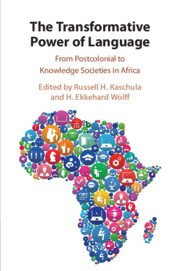
- Cited by 8
-
Cited byCrossref Citations
This Book has been cited by the following publications. This list is generated based on data provided by Crossref.
2021. Publications Received. Language in Society, Vol. 50, Issue. 4, p. 639.
Docrat, Zakeera 2022. Decolonising multilingualism in Africa: recentering silenced voices from the global south. South African Journal of African Languages, Vol. 42, Issue. 2, p. 252.
De Vos, Mark and Riedel, Kristina 2023. Decolonising and transforming curricula for teaching linguistics and language in South Africa: Taking stock and charting the way forward. Transformation in Higher Education, Vol. 8, Issue. ,
2024. States of Language Policy. p. 1.
Albaugh, Ericka Cardinal, Linda and Léger, Rémi 2024. States of Language Policy. p. 3.
Mathe, Limukani and Motsaathebe, Gilbert 2024. Reconceptualising multilingualism on African radio: a multilingual accommodation theory. International Journal of Multilingualism, p. 1.
Kgari-Masondo, Maserole C. and Zondi, Thabile 2025. Indigenous Teaching Disciplines and Perspectives for Higher Education. p. 47.
Mathe, Limukani and Motsaathebe, Gilbert 2025. Reconceptualising Multilingualism on African Radio. p. 1.
- Publisher:
- Cambridge University Press
- Online publication date:
- September 2020
- Print publication year:
- 2020
- Online ISBN:
- 9781108671088


